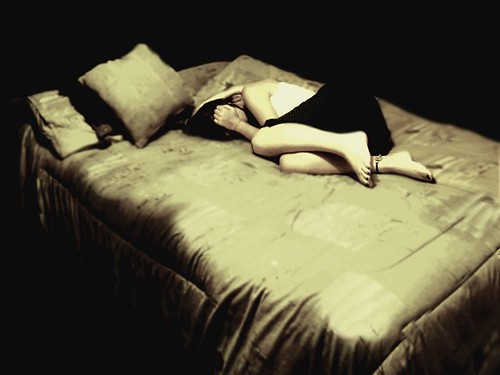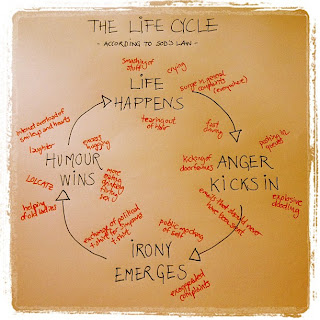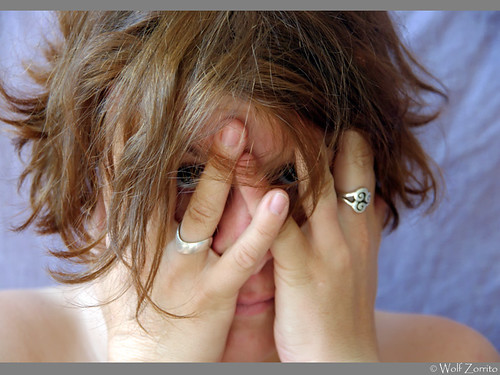Professor Malcolm Hooper has submitted an article to the Observer in response to the article by Robin McKie "
Chronic Fatigue Syndrome Researchers Face Death Threats From Militants", published on Sunday the 21st of August 2011. He has given permission for this article to be made public, and I decided to share it here, as what he has to say is so important - and he has responded so concisely to the most recent rush of abuse against ME patients in the UK. (Please note, the article posted below is the extended article. Professor Hooper first wrote a shorter letter to the Observer, at the request of the readers editor at the Observer, which he was originally told would be published - but then they decided not to do so. You can read this letter over on the
NICEGuidelines Blog. :)
I haven't blogged about all this stuff going on in the media recently, basically because I just haven't had the energy to do so. I wish I could say that I haven't let it affect me negatively, but the truth is, when this attention in the media is so constant and so well targeted, and so cruel, it's really hard not to let it get to you. I'm personally feeling just really worn out by it all, emotionally. I really don't understand why these so called journalists are only giving one side of the story, and seem to do absolutely no research whatsoever before publishing these articles. It seems like they are just 100% buying into the lies they are being fed, purely because it makes good sensational headlines.
I hope one day that ME patients will receive a formal apology from the NHS, and the media, for the treatment we've had to endure for so many decades now ..... But I'm not holding my breath!!
----------------------------------------
Professor Hooper’s response to the Observer article about Professor Wessely’s allegations of death threats:
Professor Hooper | Ph.D.,B.Pharm.,C.Chem.,MRIC
Emeritus Professor of Medicinal Chemistry
University of Sunderland, SUNDERLAND SR2 3SD
25th August 2011
No right-minded person could condone any campaign of vilification against scientists (“Chronic fatigue syndrome researchers face death threats from militants”; The Observer, Sunday 21st August 2011); equally, no right-minded person could condone what psychiatrists such as Professor Wessely have done to the UK ME community for the last 25 years.
No matter what the degree of provocation, it is indefensible to liken people with myalgic encephalomyelitis (ME) to the Animal Liberation Front extremists. This will create a further tidal wave of loathing against them. It is an inexcusable attack on the whole ME community, not just on those few people who may have behaved irrationally. It might be thought that, of all people, psychiatrists would know how to recognise and deal with unbalanced behaviour instead of exploiting it.
Wessely says he is concerned that such behaviour is putting off researchers but it is he who is putting them off by his endless purveying of so much negative publicity about people with ME. He perpetuates the dismissive, often contemptuous, attitude of many healthcare professionals toward those with the disease.
The problem is that although these scientists claim to be studying patients with ME, they are studying people with chronic “fatigue” (ie. chronic tiredness) but then claiming that their results apply to those with ME; this has resulted in a lack of appropriate NHS medical services for those with ME and in incalculable harm and distress to patients and their desperate families.
Even though the World Health Organisation has classified ME as a neurological disorder since 1969, the Wessely School teaches that it is not a neurological but a psychosocial (behavioural) disorder.
There are about 250,000 ME patients in the UK. By comparison, there are about 83,000 people in the UK suffering from multiple sclerosis, yet the far larger numbers of ME patients coping with an equally serious neurological disorder are not only denied both medical and social support but are ridiculed, mocked, disbelieved, derided and abused by those charged with their medical and social care.
Dr John Greensmith noted in a letter to The Scotsman (when Wessely was making the same claims of vilification by patients seven years ago): “It is deplorable if he has been so treated, no matter how controversial his views. It is instructive, however, to examine how Professor Wessely has raised passions to this level of fervour by, perhaps, more than any other single individual, being responsible for making the area as controversial as it is”.
There has been a constant drip-feed of denigration of patients with ME and a dismissal of ME as an organic disease over the last quarter of a century by Professors Simon Wessely, Michael Sharpe and Peter White; they all belong to a group dominated by psychiatrists (named in Hansard in December 1998 as the “Wessely School”).
Most of them work for the medical and permanent health insurance industry. The industry is panicking because it stands to lose millions if it has to pay out for a severe life-long physical illness whose worldwide incidence appears to be escalating out of control. In 1994, Wessely went on record about the industry’s concerns: “By 1990 insurance and disability claims (for ME) were doubling every year”. There is plentiful written evidence that the Wessely School advise their insurance industry paymasters that ME is a “functional” (ie. non-organic) disorder, which is to the financial advantage of the industry, as functional disorders are excluded from cover.
Wessely and his colleagues are also advisors on ME to Government Departments of State (and Wessely’s wife is Chair of the Royal College of General Practitioners); as a result, people with ME are specifically targeted by the Department for Work and Pensions, making it difficult for them to claim State benefits, with the financial support necessary for basic survival being ruthlessly withdrawn. Many very sick and destitute ME patients have had no alternative but to commit suicide, rates of which in ME are known to be higher than average (sadly, a fact does little to mitigate the charge that they were “mental malingerers”).
The Wessely School’s blatant financial conflict of interest has been roundly condemned by a group of senior parliamentarians including the former Chairman of a House of Commons Science and Technology Select Committee and former Dean of Biology; a member of the Home Affairs Select Committee; a Minister of State for the Environment; a former President of the Royal College of Physicians; the Deputy Speaker of the House of Lords, and a former Health Minister and Honorary Fellow of the Royal College of Physicians.
The Wessely School’s endless assertions that ME does not exist except as an aberrant illness belief by those who are seeking secondary gain (an assertion for which there is not a shred of evidence, as the many doctors, nurses, medical scientists, lawyers, teachers, and others who have lost their valued careers, salaries, homes, marriages and even families because of ME will readily confirm) has created a climate of disgust for patients with ME, giving rise to such banner headlines as “GPs despise the ME generation” published in the medical trade magazine “GP Medicine”. Since the 1980s, they have made a point of mocking and denigrating sufferers from ME in a way they would not dare do about patients with multiple sclerosis or other neurological disorders and this has been fed to and reflected in the national media.
The Wessely School insist that they can cure ME by “cognitive restructuring” (ie. brain-washing patients into believing that they do not suffer from an organic illness but from wrong illness beliefs) and by forcing them to ignore their symptoms and engage in a programme of incremental exercise (one MP suffering from ME collapsed and died leaving the House of Commons gym, having been told to exercise back to fitness).
What is ME?
ME is a chronic, acquired neuroimmune disorder that affects every bodily system, not only the neurological and immune systems but also the endocrine, cardiovascular and respiratory systems as well as the musculoskeletal and gastrointestinal systems.
There is evidence of widespread, chronic inflammation and of serious problems with the blood vessels in both adults and children.
The muscles of people with ME have been shown to take much longer to recover from minimal exercise. Direct impairments in oxygen delivery have been clearly demonstrated. Cardiac output in ME patients has been shown to barely meet metabolic demand, so it is no wonder that patients feel – and are – extremely ill, with profound incapacity and nausea; many patients cannot stand unsupported and often have difficulty maintaining their balance.
There are more abnormal genes in ME than in cancer: there is compelling evidence linking ME with exposure to environmental toxins and chemical warfare agents. Gene expression research has demonstrated 16 genes as having an expression profile associated with ME. Genes affecting the immune system and the functioning of muscles have been shown to be abnormal. A neuronal component was identified that is associated with hypomyelination of the central nervous system. The researchers specifically pointed out the association of organophosphates (which include household pesticides) and chemical warfare agents with the damaged genes.
Notably, after one of the researchers who discovered these acquired (not inherited) gene abnormalities in ME, Dr Jonathan Kerr, publicly criticised the psychiatrists who control funding for ME research at the Medical Research Council, he lost his tenure and his contract was not renewed.
He was not hounded out of his research by patients with ME, but by those whose mission seemed to be to ensure that his voice was silenced, leaving the way open for more dismissal and disparagement of those battling a devastating disease.
At a press briefing in the United States on 3rd November 2006, ME was described by Anthony Komaroff, Professor of Medicine at Harvard and a world-renowned ME expert as “this terrible illness”.
People die from ME and UK coroners have recorded it as a cause of death.
Evidence from autopsies of ME patients is chilling: there is evidence of oedema, inflammation in 75% of the spinal cord, damaged arteries, congestion of the liver and spleen, ischaemia of the bowel, rhabdomyolysis (the breakdown of muscle fibres with release of muscle fibre contents into the circulation, some of which are toxic to the kidney), and degeneration of the brain. The Medical Director of one US support foundation commented: “Every time you look closely at someone with this disease, you see immense suffering. There appears to be no limit as to the human toll that this disease is capable of exerting on patients”.
However, when in 2002 the UK Chief Medical Officer publicly stated that ME should be recognised alongside disorders such as multiple sclerosis and motor neurone disease, the British Medical Journal quoted Professor Michael Sharpe responding by saying that just because the CMO says something, it doesn’t mean that doctors will pay any attention.
The Wessely School’s published views about people with ME
Since about 1987 the Wessely School have consistently rejected the biomedical evidence of serious organic pathology in ME.
In 1990 Wessely asserted that ME exists “only because well-meaning doctors have not learnt to deal effectively with suggestible patients”.
That same year he wrote in a medical textbook: “The description given by a leading gastroenterologist at the Mayo Clinic remains accurate: ‘The average doctor will see they are neurotic and he will often be disgusted with them’ ”.
In 1991, he cited medical comments made between 1880 and 1908 on patients with neurasthenia, with the clear implication that such descriptions apply equally well to today’s ME patients: “always ailing, seldom ill; a useless, noxious element of society; purely mental cases; laziness, weakness of mind and supersensitiveness characterises them all; the terror of the busy physician”.
In 1992 the Wessely School directed that in patients with ME, the first duty of the doctor is to avoid legitimisation of symptoms; that same year, Wessely went on record about his intention to “eradicate” ME.
In 1994 ME was described by Wessely as merely “a belief” and a “myth” (“I will argue that ME is simply a belief, the belief that one has an illness called ME……I will argue that this line here (pointing to a slide)represents…the line between real and unreal illness”) and he openly named and mocked a seriously ill ME patient in a lecture; that person is now dead.
In 1996, under the guise of a Report from the Joint Royal Colleges of Physicians, Psychiatrists and General Practitioners, the Wessely School recommended that no investigations should be performed to confirm the diagnosis. (This advice to doctors was re-stated in the 2007 NICE Clinical Guideline on “CFS/ME” in which the Wessely School were instrumental. This means that investigations such as a comprehensive immune profile cannot be ordered in the UK -- even though one specific immune test always corresponds to disease severity in ME patients -- nor can patients be sent for fMRI scans that show clear evidence of hypoperfusion in the brain, nor can doctors request SPECT scans that show reduced blood flow through the brain stem in ME patients in a particular pattern that to date has not been found in any other disease process).
In 1997 Professor Michael Sharpe referred to ME as a “pseudo-disease diagnosis”.
In 1999 Sharpe said about ME patients: “Those who cannot be fitted into a scheme of objective bodily illness yet refuse to be placed into and accept the stigma of mental illness remain the undeserving sick of our society and our health service”.
Between February and April 2002 Wessely was involved with a poll of “non-diseases” carried out amongst doctors by the British Medical Journal: along with big ears and freckles, the poll found ME to be a non-disease that is best left medically untreated. As a result, patients with ME were struck off their GP’s list, one extremely sick person being told scathingly “This practice does not treat non-existent diseases”.
For those who want or need to find out about the published organic pathology in ME, a summary of the biomedical abnormalities can found in Section 2 of “Magical Medicine: How to Make a Disease Disappear” (http:///www.meactionuk.org.uk/magical-medicine.htm) and those who want a fully referenced account of what the Wessely School and the insurance industry are really up to can read the rest of the 442 page report.
The Wessely School’s dismissal and rejection of the biomedical evidence on ME has continued unabated. It was not the fact that UK scientists such as Professor Myra McClure failed to find evidence of the retrovirus XMRV found in ME patients by US researchers that caused such an eruption of anger within the ME community: it was the utterly triumphant and contemptuous comments of certain of those scientists whose studies failed to replicate the original XMRV study published in Science (2009:326:585-589) that so incensed some people with ME and the medical scientists and clinicians who are striving to help them.
The views of the Wessely School about ME have repeatedly been shown by medical scientists of international repute to be completely wrong: the recently published International Consensus Criteria for ME produced by 26 world experts from 13 countries points to widespread inflammation and multisystemic neuropathology, consistent with the WHO classification of ME as a neurological disorder, of which the cardinal symptom is post-exertional nalaise. The authors state: “Myalgic encephalomyelitis (ME), also referred to in the literature as chronic fatigue syndrome, is a complex disease involving profound dysregulation of the central nervous system and immune system, dysfunction of cellular energy metabolism and ion transport and cardiovascular abnormalities. The underlying pathophysiology produces measureable abnormalities in physical and cognitive function and provides a basis for understanding the symptomatology.”
What is astonishing is that no NHS clinician has the autonomy to regard ME as a somatoform disorder because the WHO classifies it as a neurological disorder; the Department of Health has confirmed in writing that: “The ICD-10 is an NHS Information Standard….The NHS has a long history of using the ICD. There is a legal obligation for Department of Health to provide ICD data to the WHO for international comparison. The NHS was mandated to implement ICD-10 on 1 April 1995, at which time there was a formal consultation (emphasis added)….Implementation…applies to NHS organisations and their system suppliers, such as acute and foundation trusts, primary care trusts, and the NHS Information Centre”.
Not only the Wessely School themselves but also many GPs and NHS neurologists are in breach of that mandate: in 2010, 84% of neurologists questioned stated that they do not believe that ME exists as a neurological condition.
Who is abusing whom?
For the Wessely School to ignore the scientific evidence that ME is a biomedical disorder is abusive of patients with the disorder; for them to advise the DWP decision-makers and to train ATOS examiners that ME is a mental disorder is abusive; to section patients with ME and remove them from their distraught families is abusive; to make sick people worse by inappropriate interventions is abusive; to deny them financial support necessary to survive is abusive; to mock them and to misinform others about their serious disorder is abusive; to insist that they suffer from wrong thinking and a fear of activity when they suffer from a very serious and significant medical disorder with reproducible multiple systemic abnormalities is abusive.
This widespread abuse of ME patients continues unabated in the UK.
Robin McKie implies that it is these scientists themselves who are being abused by the very patients they are trying to help. If this is true – and if it is corroborated by the police and is not another public attack on people with ME so often used by the Wessely School in the past when yet more research appears that vitiates their own beliefs -- it is an entirely unacceptable state of affairs and must be condemned without reservation.
However, responsible journalists should exercise the requisite journalistic neutrality when reporting a “story” and report the whole issue, not just regurgitate uncritically what they are fed by those with well-established vested interests. McKie would do well to redress the balance by reporting the presentation by Catriona Courtier at the Royal Society of Medicine meeting in the “Medicine and me” series on 11th July 2009 in which she emphasised the scandalous situation faced by ME patients in the UK:
“Over the twenty years I have had this illness, what has really bedevilled the situation of patients with ME has been the belief, which has been persistently promulgated, that we are suffering, not from a physical illness but from an illness belief. This is at the root of all the problems we experience: the lack of resources, the hostility and disbelief from some doctors, the ignorance and disinterest in our symptoms, the ineffective treatments, the harmful treatments and in the very worst cases, the imposition of psychiatric treatment against the patient's wishes.
“Those who promulgate the view that ME is an illness belief have undermined the mutual trust and respect that should exist between doctor and patient. They have done a great disservice to both patients and to the medical profession.
“I began by describing the severely affected as the weakest among us. In some ways they are the strongest… to live for many years with an illness like ME is a huge feat of human endurance and courage but is seldom recognised as such. People with ME at all levels deserve to be respected. They deserve to be listened to”.
That patients with ME continue to be neither listened to, appropriately investigated nor correctly cared for but abused and effectively abandoned is believed by many to be the shameful legacy of the Wessely School.
Notes for Editors
1. All the above statements can be substantiated by literature references.
2. Much other information has been omitted purely for reasons of space; there are many harrowing stories, as documented by Natalie Boulton in her book “Lost Voices” and her DVD “Voices from the Shadows” that is to be shown at an international film festival in the autumn.
Professor Hooper's Response to The Observer's Article About Professor Wessely's Allegations of Death Threats











 ) by having to go out. As those of you who are friends with me on Facebook may know, my appointment fell on the day after the first night of (ridiculous & pointless!!) rioting in Liverpool. The areas all around the hospital, and the area I live were the worst affected in the whole city. Overnight, we were concerned that we may not be able to safely reach the hospital, but by morning, the streets were cleared, opened, and settled again, (though there was lots of broken glass, fire engines, and many cars had obviously been vandalised or set fire to) and we managed to get to the hospital with no problems at all. Phew. (Can I just say, I was really proud of the way
) by having to go out. As those of you who are friends with me on Facebook may know, my appointment fell on the day after the first night of (ridiculous & pointless!!) rioting in Liverpool. The areas all around the hospital, and the area I live were the worst affected in the whole city. Overnight, we were concerned that we may not be able to safely reach the hospital, but by morning, the streets were cleared, opened, and settled again, (though there was lots of broken glass, fire engines, and many cars had obviously been vandalised or set fire to) and we managed to get to the hospital with no problems at all. Phew. (Can I just say, I was really proud of the way 


